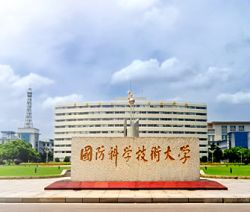National University of Defense Technology
The National University of Defense Technology (NUDT 国防科技大学) is a comprehensive national key university under the dual supervision of the Ministry of National Defense and the Ministry of Education as designated by Project 211 and Project 985, the two national plans for facilitating the development of Chinese higher education. NUDT was originally founded in 1953 as the Military Academy of Engineering at Harbin in Heilongjiang Province. In 1970 the Academy of Engineering moved southward to Changsha and was renamed the Changsha Institute of Technology. It changed its name to the National University of Defense Technology in 1978. NUDT is located in the urban area of Changsha, the capital city of Hunan Province in South-Central China, covering a total area of 373 hectares.
Over the past 50 years NUDT has developed into a comprehensive university of science, engineering, military science, management, economics, philosophy, literature, education, law and history. The university consists of 10 colleges administering to over 40 departments, institutes and laboratories, four national key laboratories and one key laboratory at the Ministry of Education level. NUDT plays a leading role in many subjects, nine of which are national key subjects. According to the National First-Category Discipline Evaluation from the years 2002-2004 organized by the Ministry of Education, five disciplines of NUDT made the ‘top five’ list and the discipline of Computer Science and Technology ranked first nationwide.
NUDT now has over 2,000 faculty members of which nearly 300 are professors. There are 15,700 full-time students including 8,900 undergraduates and 6,800 graduates. NUDT offers 25 programs for undergraduates, 95 programs for Masters degree candidates and 51 programs for PhD candidates. Moreover, 11 mobile post-doctoral research stations have been authorized on campus.
NUDT encourages international collaboration and cooperation. With a strong commitment to internationalization, the university has academic ties with over 100 universities and research institutes from more than 40 countries and regions. It has signed formal collaboration agreements with 20 well-known universities. The university invites hundreds of scholars of international fame to give lectures and academic seminars every year and holds large-scale international academic conferences. The university annually sends out more than 700 teaching or research staff as short-term overseas visitors to study, to carry out joint research, or to pay academic visits.
